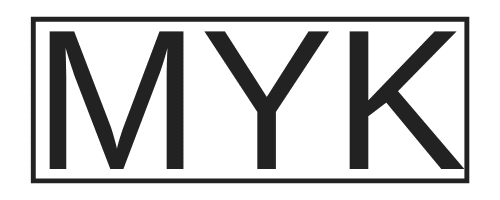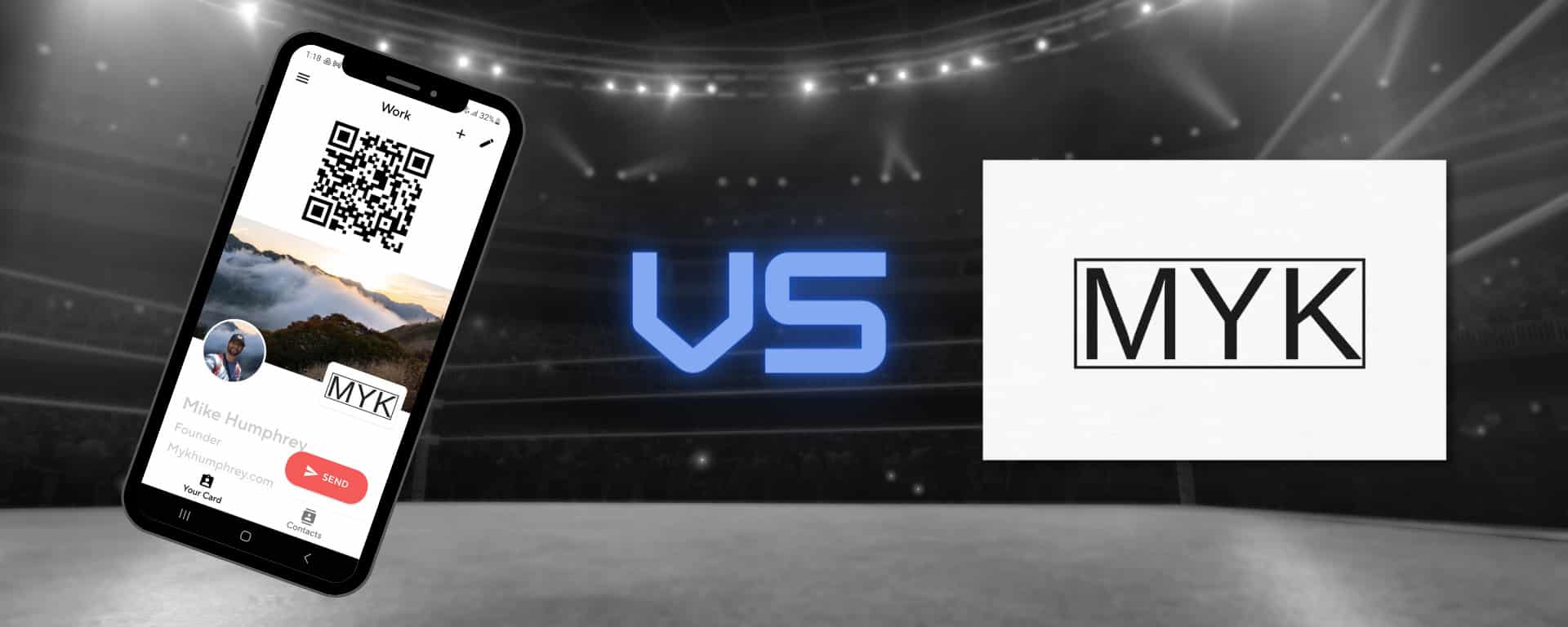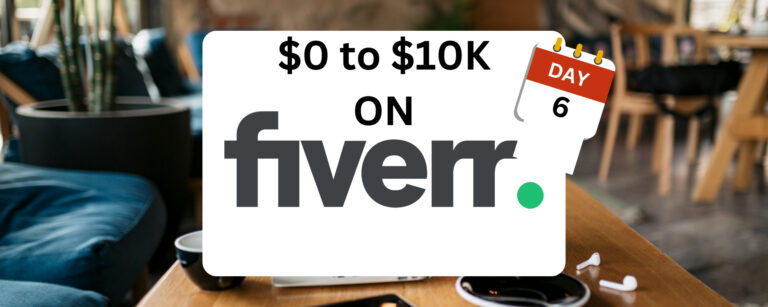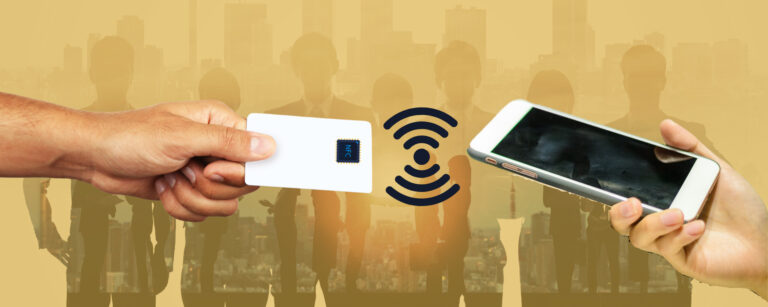Pros and Cons of Paper vs Digital Business Cards: Which is Better?
We’ve all been there – you meet someone, exchange business cards with them, and then tuck them away, never to be seen again, so what should you consider when you’re thinking about paper vs digital business cards?
Getting your first business card is a right of passage. You eagerly pick a design, making sure to put all the correct information on it. Then cautiously walk up to the first recruiter at a job fair and tentatively hand over your card.
You’ve done it. You made your first connection, and the business world will open up before your eyes.
The truth is the recruiter probably got hundreds of business cards that day. They are all going into a pile and will likely never be seen again.
Let’s be honest. We’ve all done it, received a business card, only to promptly stuff it in our pocket and forget about it.
So if all these business cards end up as crumpled paper in someone’s freshly washed slacks, you may ask yourself, what’s the point of printing them in the first place?
Despite being an antiquated system, business cards still work.
But we must ask ourselves if electronic business cards are this new technology everyone has been looking for. Plus, it’s hard for a digital business card to end up in the washer…
Digital Business Cards Pros
The transition to digital cards is a step change in how we share our personal and professional contact information. Here are some pros of the best digital business cards:
- Easier to Share: QR codes and NFC tags make it easy to share your business card with just a tap digitally.
- Seamless integration: Sync your contacts with CRM systems and other tools for better organization.
- Never Lose A Card: Digital cards are stored in the cloud, so you’ll never lose them again.
- Multimedia Capable: You can now include videos, images, and other multimedia elements in your card.
- Cost-effective: No more spending on printing or replenishing your card stock – update your digital card as needed.
- Dynamically updatable: Change jobs? New phone number? Update your info instantly without reprinting anything.
- Eco-friendly: Save trees by ditching paper business cards and going digital.
Cons of Digital Business Cards
As with any new technology, there are also some drawbacks to digital business cards that you should be aware of:
- Security Issues: With all your data stored in the cloud, security, and privacy become issues.
- Cost: While many services offer free options, you must pay a monthly subscription for all the features.
- Lasting Impression: You won’t get that personal connection of giving someone a unique paper business card with your contact information.
Pros of Paper Business Cards
Traditional business cards are centuries old, and there”s a reason. They work and have worked for a long time. So why reinvent the wheel? Traditional paper business cards offer some great benefits:
- Easy to Carry: Paper cards are small and fit easily into wallets or pockets.
- Personalized Touch: People keep physical business cards longer than digital ones.
- No Dependency on Technology: You don’t need a specific technology or device to use them.
- Cost-effective: You can get many printed business cards for very little money.
Cons of Paper Business Cards

Before you decide to stick with paper cards, keep in mind that they have some drawbacks too:
- Outdated Information: You’ll need to order new cards if any of your contact information changes.
- Wasteful: Throwing away outdated business cards is wasteful and not very eco-friendly.
- Expensive: You must pay a premium for more customized or creative cards.
- Durability: Paper cards can get damaged easily and look worn out after handling too much.
88% of business cards handed out get thrown away within a week!
Paper vs Digital Business Cards
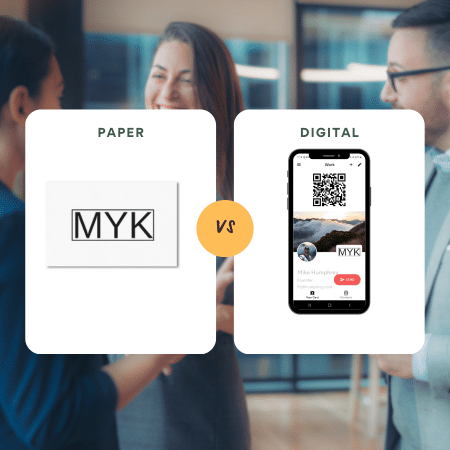
Which one is best, you ask? I’m here to give you my opinion, and it may not be what you want to hear.
You need both!
Yes, you read that correctly. It’s essential to have both types of cards in your arsenal. Digital business cards are great for networking online, while paper cards are perfect for face-to-face meetings and events.
Having one doesn’t mean you should abandon the other – think about it as a complementary duo rather than an either/or situation.
An NFC business card can be a great solution. It combines a single physical business card with an NFC chip that links to your digital business card.
Why You Still Need a Printed Business Card
Nothing substitutes having a physical business card to hand out. Certain situations, like networking events or job interviews, require you to have a physical card.
Plus, paper cards allow for more creative design possibilities so that you can stand out in the crowd. They are also a great way to leave a lasting impression and act as a reminder of your services or products.
Why You Should Go Digital
On the other hand, digital cards are a great way to connect with people quickly and efficiently. They are more eco-friendly than printed cards, and you can promptly update any information that changes.
Almost every digital business card application has a free option. Creating an electronic business card takes 5-10 minutes and is free. Why wouldn’t you want to make a digital business card? Some of the top business cards are:
Alternatively, you can create your own digital business card using one of these free QR code generators and Canva.
When to Consider Paying For a Digital Business Card
Paying for a digital business card is something you should consider if:
- You have a large team: Enterprise solutions are ideal for larger teams and allow for consistent branding and sharing of contact details across organizations.
- You use a CRM: If your team uses Hubspot or SalesForce, you can integrate digital business cards into your workflows and contact management systems. Track when and where your customer journey starts and incorporate this into your sales system
- You want to track analytics: analytics is usually a paid feature for most business card apps. You need to upgrade if you’re going to track click-throughs and interactions with your digital business cards.
Final Thoughts
Paper business cards have long been a staple in the business world. They offer a personal connection that leaves a lasting impression and reminds you of your brand or services. However, keeping them up-to-date can be challenging and creates waste.
On the other hand, digital business cards have revolutionized how we exchange contact information. With the convenience of QR codes and NFC tags, sharing your details has become quicker and more efficient. Additionally, digital cards boast advantages like seamless integration with CRM systems, multimedia capabilities, and instant updates without reprints.
So, which one is truly better? The answer lies in embracing both paper and digital business cards as complementary tools in your networking arsenal. Each excels in specific scenarios, and combining the two enhances your outreach strategy.
A printed business card is a must for face-to-face meetings and networking events, where the physical presence of a card can leave a memorable impression and serve as a visual cue of your professionalism.
On the other hand, digital business cards are perfect for connecting with others online. They offer eco-friendliness, real-time updates, and a hassle-free exchange of information.
Consider investing in digital business cards if you have a larger team, use CRM systems, or desire in-depth analytics to track interactions with your cards. The cost-effectiveness and convenience of digital options make them an attractive choice for modern businesses.
Choosing paper versus digital business cards ultimately depends on your unique needs, preferences, and circumstances. By harnessing the benefits of both mediums, you can maximize your networking potential and effectively engage with clients, colleagues, and partners alike.
FAQ
Are digital business cards a good idea?
Yes! Digital business cards are a great way to quickly and efficiently connect with people. They’re eco-friendly, easy to update, and most have a free version. Some digital business card providers are:
Can I track interactions with my digital business card?
Yes – however, this is usually a paid feature. A digital business card app will allow you to upgrade your plan to include analytics. You can track how many people have clicked through your digital business card and which links they interacted with.
What is the difference between traditional and digital business cards?
Traditional business cards are on paper, whereas digital business cards are shared digitally. Digital business cards are quickly accessible, while paper cards require additional time and money to print new copies. Additionally, digital business cards allow for analytics tracking, such as click-throughs and interactions with the card.
Are paper business cards still relevant?
Yes! Although digital business cards are becoming increasingly popular, paper business cards are still important in the modern world. Paper business cards can be kept as a physical reminder of your contact information.
Why switch to digital business cards?
A digital business card has many advantages over a paper business card. They are cheaper, faster to create and distribute and help you save time by automating the process of swapping contact information. Digital business cards are also more eco-friendly as you don’t need physical materials to produce them. Finally, they make it easier for people to connect with you quickly and conveniently.
